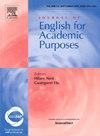Metadiscursive nouns in academic argument: ChatGPT vs student practices
IF 3.4
1区 文学
Q1 EDUCATION & EDUCATIONAL RESEARCH
引用次数: 0
Abstract
The ability of ChatGPT to create grammatically accurate and coherent texts has generated considerable anxiety among those concerned that students might use such large language models (LLMs) to write their assignments. The extent to which LLMs can mimic human writers is starting to be explored, but we know little about their ability to use nominal resources to create effective academic texts. This study investigates metadiscursive nouns in argumentative essays, comparing how ChatGPT and university students employ these devices to organise text, express stance, and construct persuasive arguments. By analysing 145 essays from each source, we examine the syntactic patterns, interactive functions, and interactional uses of metadiscursive nouns. The analysis reveals that while overall frequencies were similar, ChatGPT has distinct preferences for simpler syntactic constructions (particularly the determiner + N pattern) and relies heavily on anaphoric references, whereas students demonstrate more balanced syntactic distribution and greater use of cataphoric references. Interactionally, ChatGPT prefers manner nouns for descriptive precision, while students favour status nouns for evaluative reasoning and evidential nouns for empirical grounding. These findings show that, while structurally coherent, LLM-generated texts often lack the rhetorical flexibility and evaluative sophistication of human academic writing, offering valuable insights for EAP pedagogy.
学术论辩中的元引语名词:ChatGPT与学生实践
ChatGPT创建语法准确且连贯的文本的能力在那些担心学生可能会使用如此大的语言模型(llm)来写作业的人中产生了相当大的焦虑。法学硕士模仿人类作家的程度已经开始被探索,但我们对他们利用名义资源创造有效学术文本的能力知之甚少。本研究调查了议论文中的元话语名词,比较了ChatGPT和大学生如何使用这些工具来组织文本、表达立场和构建有说服力的论点。通过分析来自各个来源的145篇文章,我们研究了元话语名词的句法模式、交互功能和交互用法。分析表明,虽然总体频率相似,但ChatGPT明显倾向于更简单的句法结构(特别是限定词+ N模式),并且严重依赖回指引用,而学生表现出更平衡的句法分布和更多地使用回指引用。在互动方面,ChatGPT倾向于使用方式名词来精确描述,而学生则倾向于使用状态名词来进行评价推理,使用证据名词来进行经验基础。这些发现表明,法学硕士生成的文本虽然结构连贯,但往往缺乏人类学术写作的修辞灵活性和评估复杂性,这为EAP教学法提供了有价值的见解。
本文章由计算机程序翻译,如有差异,请以英文原文为准。
求助全文
约1分钟内获得全文
求助全文
来源期刊

Journal of English for Academic Purposes
Multiple-
CiteScore
6.60
自引率
13.30%
发文量
81
审稿时长
57 days
期刊介绍:
The Journal of English for Academic Purposes provides a forum for the dissemination of information and views which enables practitioners of and researchers in EAP to keep current with developments in their field and to contribute to its continued updating. JEAP publishes articles, book reviews, conference reports, and academic exchanges in the linguistic, sociolinguistic and psycholinguistic description of English as it occurs in the contexts of academic study and scholarly exchange itself.
 求助内容:
求助内容: 应助结果提醒方式:
应助结果提醒方式:


